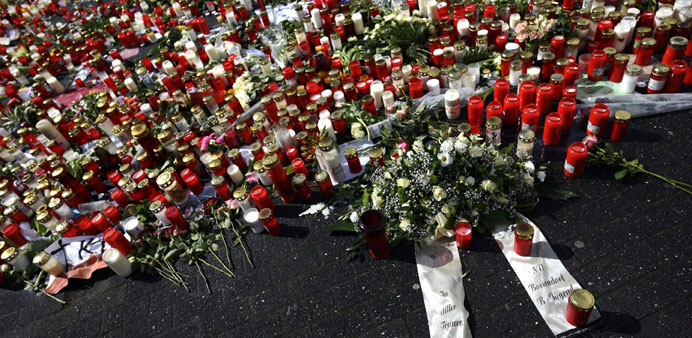A memorial of flowers and candles in front of the Joseph-Koenig-Gymnasium secondary school in Haltern am See, western Germany, from where some of the Germanwings plane crash victims came.
By Jessica Camille Aguirre/Paris/DPA
Pressure grew yesterday for German airline Lufthansa to explain how Andreas Lubitz - a young man who had exhibited suicidal tendencies and suspended a training programme due to depression - could have been left at the helm of ill-fated Germanwings flight 4U9525.
Lufthansa chief executive Carsten Spohr declined to comment yesterday on when the airline learned of problems plaguing the 27-year-old co-pilot, who is believed to have intentionally crashed the plane into a mountainside in France last week, killing himself and 149 others on board.
“We are learning more every day, but it will take a long, long time to understand how this could happen,” Spohr said during a visit to a memorial near the crash site alongside Germanwings chief executive Thomas Winkelmann. Lufthansa is Germanwings’ parent company.
“We’re very, very sorry that such an accident could have happened at Lufthansa, where we put so much focus on safety. We are sorry for the losses that occurred and there are just no words to express this,” Spohr said.
Lufthansa had said its flight training school knew of Lubitz’s problems with depression. The company on Tuesday produced a 2009 e-mail in which Lubitz explained he was ready to resume flight training after a break.
In it, Lubitz informed the school of a “previous episode of severe depression”, sparking questions about why his history did not raise red flags at the airline.
Lufthansa provided the e-mail along with other documents to prosecutors in the German city of Dusseldorf and said it was cooperating fully with the investigation.
Prosecutors said that Lubitz had been in treatment with psychiatrists and neurologists, and that a doctor had noted a suicidal tendency in him before he received his pilot’s licence.
Earlier, Spohr said Lubitz had passed all his medical tests and that he “was fit for flying without any restrictions.” Medical records outlining the suicidal tendencies were protected under German confidentiality laws and it is unclear if Germanwings was aware of that section of Lubitz’s file.
He also passed medical and psychological evaluations to obtain a student pilot certificate from the US Federal Aviation Authority in 2010.
In Berlin, a spokeswoman for the German transport ministry said it would not consider changes to the country’s pilot selection standards until prosecutors in Dusseldorf have finished their investigation.

